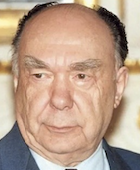Rationale for Inclusion
- Innovative Aircraft Designs: Yakovlev was known for his innovative approach to aircraft design, focusing on simplicity, reliability, and performance. He created a range of successful aircraft, particularly during World War II, that were crucial to the Soviet Union’s military efforts. His designs were characterized by their maneuverability and ease of production, making them highly effective in combat.
- Contributions to Military Aviation: One of Yakovlev’s most significant contributions was the development of the Yak-1 fighter plane, which played a vital role in the Soviet Union’s air battles during World War II. The Yak-1, along with its successors, the Yak-3, Yak-7, and Yak-9, were some of the most produced and effective fighter aircraft of the war. These aircraft were instrumental in achieving air superiority on the Eastern Front and contributed to the Allies’ eventual victory. He further designed the Soviet Union’s first supersonic bomber. Yakovlev’s ability to design aircraft that met the needs of the Soviet military made him a key figure in the development of Soviet air power. His work helped establish the Soviet Union as a leading force in military aviation.
- Influence on Commercial Aviation: In addition to his military contributions, Yakovlev also made significant advancements in civil aviation. He designed successful civilian aircraft, such as the Yak-12 utility aircraft and the Yak-40 regional jet. The Yak-40, in particular, was one of the first regional jets in the world and became widely used in both domestic and international markets. His work in civil aviation helped expand the Soviet Union’s commercial aviation capabilities and contributed to the global development of regional air travel.
- Enduring Legacy: Alexander Yakovlev is a significant figure in aviation due to his pioneering aircraft designs, contributions to both military and civilian aviation, and his lasting influence on the development of aviation technology. His work helped shape the trajectory of Soviet and global aviation, making him a key figure in the history of flight.

Biography
- Early Life and Education: Alexander Sergeyevich Yakovlev was born on April 1, 1906, in Moscow, Russia. From a young age, he displayed a keen interest in aviation, inspired by the rapid advancements in flight technology during the early 20th century. In 1924, Yakovlev enrolled at the Zhukovsky Air Force Engineering Academy in Moscow, one of the leading institutions for aviation studies in the Soviet Union.
- Early Career: After completing his education, Yakovlev joined the Moscow Aviation Plant, where he began his career as an aircraft designer. He quickly demonstrated his talent for innovation and design, leading to his appointment as head of the Experimental Design Bureau in 1932. This position allowed him to work on a variety of aircraft projects and experiment with new ideas. One of Yakovlev’s first significant contributions was the creation of the AIR-1, a small sports plane designed in 1927.
- Yakovlev Design Bureau: As head of the Yakovlev Design Bureau, he played a crucial role in developing several iconic aircraft for the Soviet military. One of his most notable creations was the Yak-1 fighter, which became one of the Soviet Union’s most effective fighter planes during the war. Building on the success of the Yak-1, Yakovlev developed a series of fighter aircraft, including the Yak-3, Yak-7, and Yak-9, which became some of the most produced fighter aircraft of the war. A member of the Communist Party of the Soviet Union from 1938, Yakovlev served from 1940 to 1956 as a deputy minister of the aircraft industry and as chief designer thereafter.
- Legacy and Influence: Alexander Yakovlev passed away on August 22, 1989, but his influence on aviation remains significant, with the Yakovlev Design Bureau continuing to produce aircraft well into the modern era.
- In his life, Yakovlev received a variety of awards and accolades, including:
- The Order of Lenin – awarded on eight separate occasions
- Membership into the U.S.S.R Academy of Sciences (1976)
